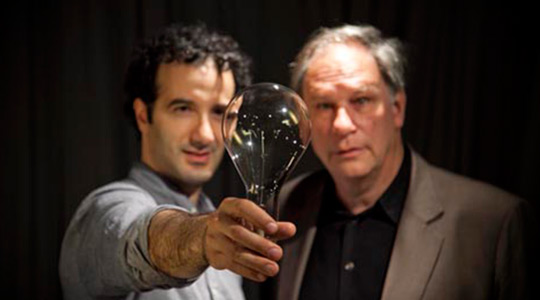
Finding the signal through the noise: How Radiolab uses Dropbox for Business
Radiolab is a podcast and public radio program that investigates the interesting ways in which the world works. Produced in New York City and broadcast each week on more than 300 U.S. public stations, Radiolab explores monumental topics such as time, randomness, the limits of the mind, and the physics of the universe.
Finding holes in the old methodology
When Radiolab first began, its small staff was able to share ideas, story drafts, and pertinent files in person and on the spot. As Radiolab's Executive Producer Ellen Horne remembers, "It was just a couple of us in the office, so you could jump into a room and listen to something quickly." But as the show grew in popularity, its staff grew along with it. Radiolab needed to find a new way to keep everyone on the same page. "The show is deeply iterative," says Horne. "We're not just reading scripts. When we develop stories, we do draft after draft-passing them around to the staff, getting feedback, making new drafts...it's not uncommon for us to go through forty or fifty drafts." The process of sharing drafts and related materials began to get cumbersome. "We wasted hours creating CDs and printing versions to put in the mail or fax," she says. In an effort to make the process easier, Radiolab invested in an account with Apple's file sharing service, iDisk. But eventually, the company realized the limits of this approach, such as lack of mobile accessibility and severe space limitations.
"Dropbox makes managing communication and getting our three hundred stations the materials they need effortless."
Developing a new formula for teamwork
Several Radiolab employees were already using Dropbox for personal use. "I had a Dropbox account, which I used largely for sharing information with family," Horne explains. When Radiolab learned about Dropbox for Business, they were thrilled. It offered storage that could grow with the company, as well as the ability to share files quickly and easily, regardless of where reporters, hosts, or producers were physically located. Horne describes the transition to Dropbox for Business as very simple. "It was very intuitive; everyone on the team got the hang of it very fast," she says. The features that Radiolab finds critical include the ability to share an entire folder or a single file, and the option to select and listen to favorite files via smartphone. "Most of us spend up to an hour on the subway every day, so being able to listen to drafts on the train through Dropbox makes the commute a productive and delightful time," Horne says.
Qualitative results that count
Dropbox for Business has also greatly enhanced collaboration for Radiolab. Communication and sharing with offsite show contributors has become much simpler with shared links. For instance, when the team needs to pass a draft to host Robert Krulwich, who works offsite at NPR, they can simply send him a link to the recording and get his feedback right away-instead of having to email a large file that is time consuming to download. Previous concerns about staff location or technical sophistication are almost completely eliminated with Dropbox for Business. Horne says, "It's been sort of surprising how much easier Dropbox has made collaboration — particularly with people who aren't in the office with us. Remote employees are in a much better position now." Content distribution is another area that improved with Dropbox for Business. Horne explains, "We have three hundred stations carrying our show and they need promos and episodes. Dropbox makes managing communication, and getting all of our stations the materials they need, effortless." When it comes to planning and executing roadshows, Horne says Dropbox for Business is critical. She relies on Dropbox to distribute materials to potential collaborators — to give them a sense of what the roadshows are like — and ultimately figure out exactly how the next show will look. Then when it's time to leave for the tour, Horne no longer wastes time figuring out exactly which files to bring on her external disk. With Dropbox for Business, she says, "No matter where I go, I have what I need. There's no time spent gathering things and preparing." Although Dropbox for Business was initially intended as a next-step replacement for iDisk, Radiolab has found it to be far more useful. Horne says, "We're finding that as a team we're working together better with Dropbox than we've ever worked before."